2024年广东省中考英语总复习课件 动词(含动词短语)(共66张PPT)
文档属性
| 名称 | 2024年广东省中考英语总复习课件 动词(含动词短语)(共66张PPT) |

|
|
| 格式 | pptx | ||
| 文件大小 | 346.3KB | ||
| 资源类型 | 教案 | ||
| 版本资源 | 通用版 | ||
| 科目 | 英语 | ||
| 更新时间 | 2024-05-08 19:40:18 | ||
图片预览

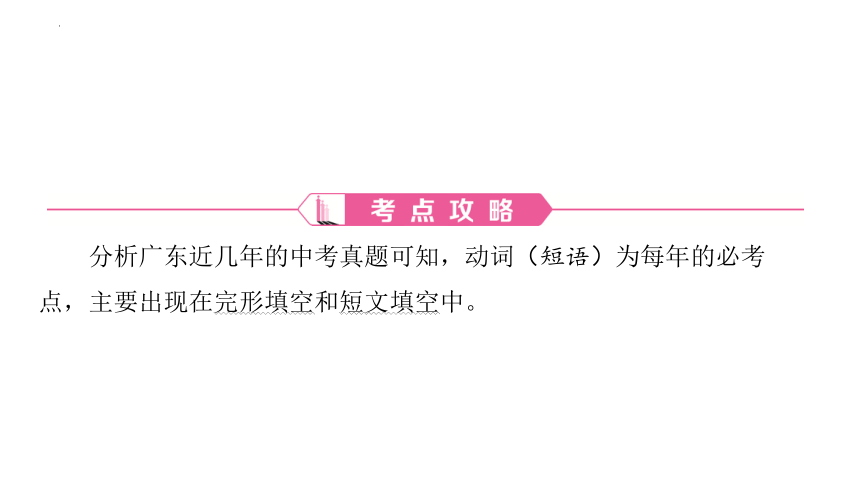
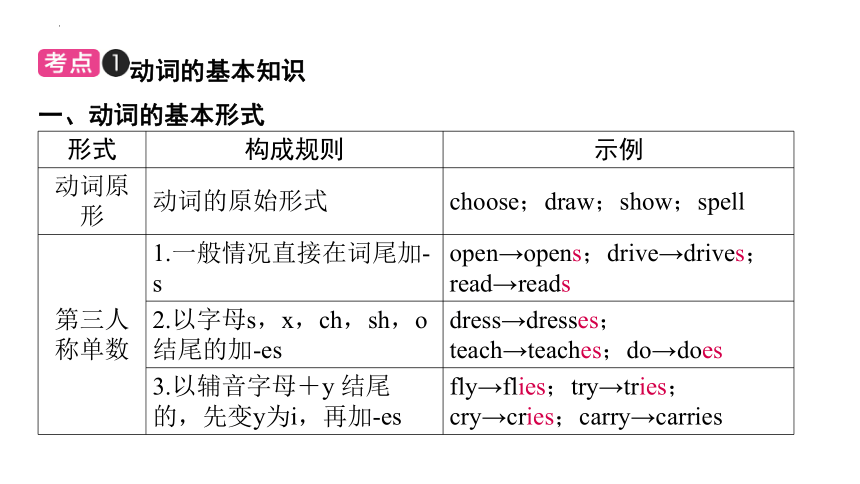
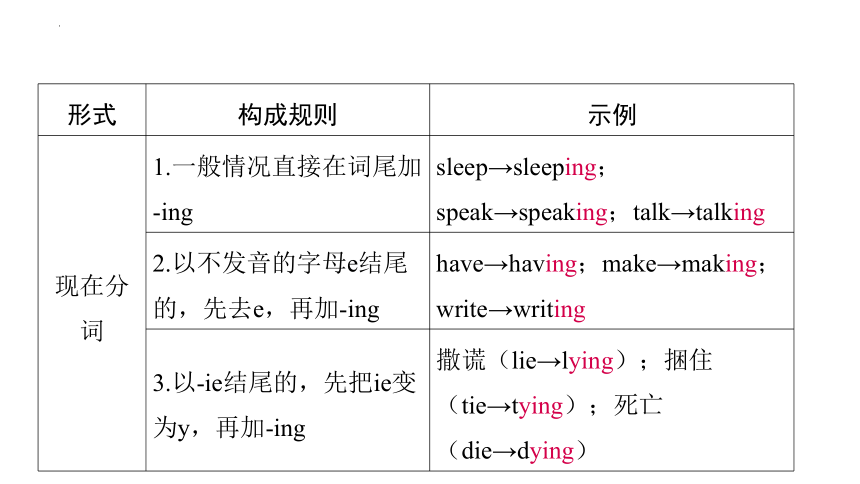
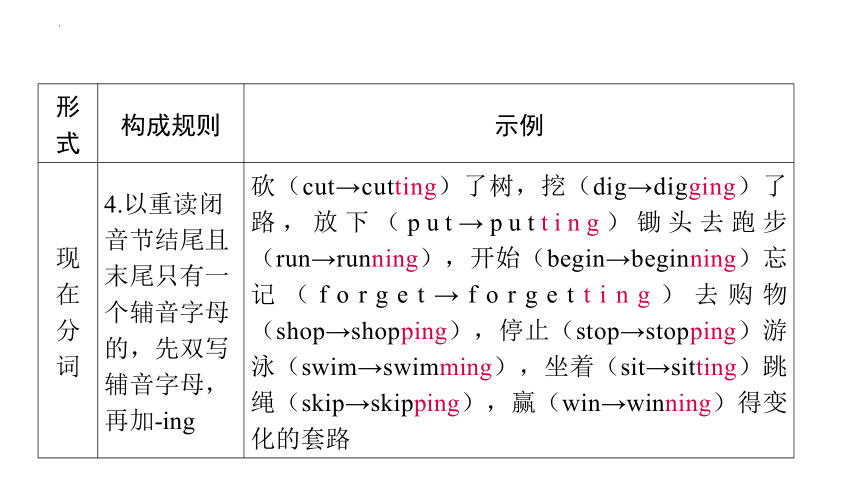
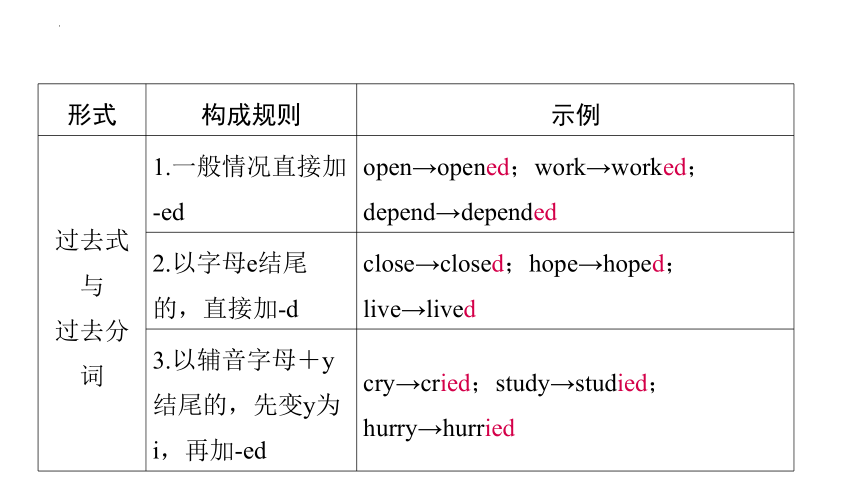
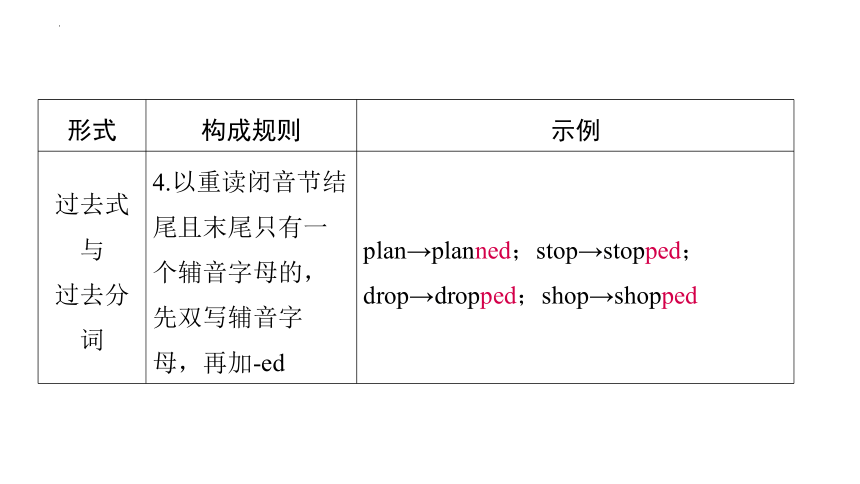
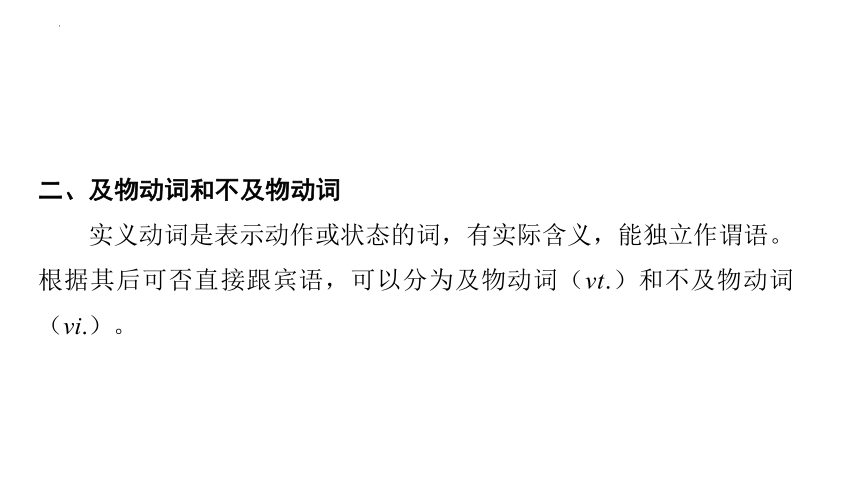
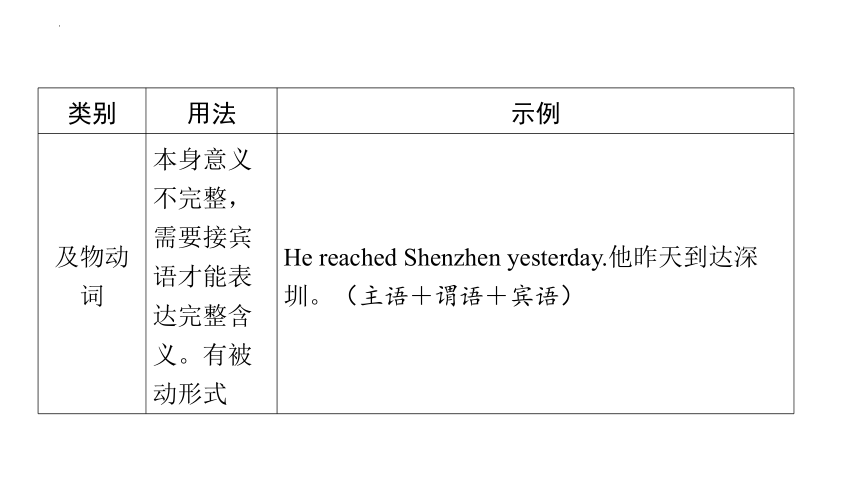

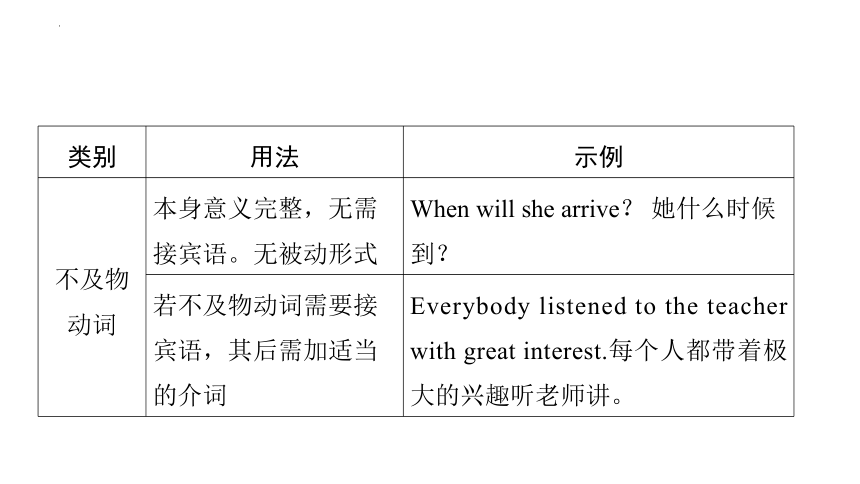
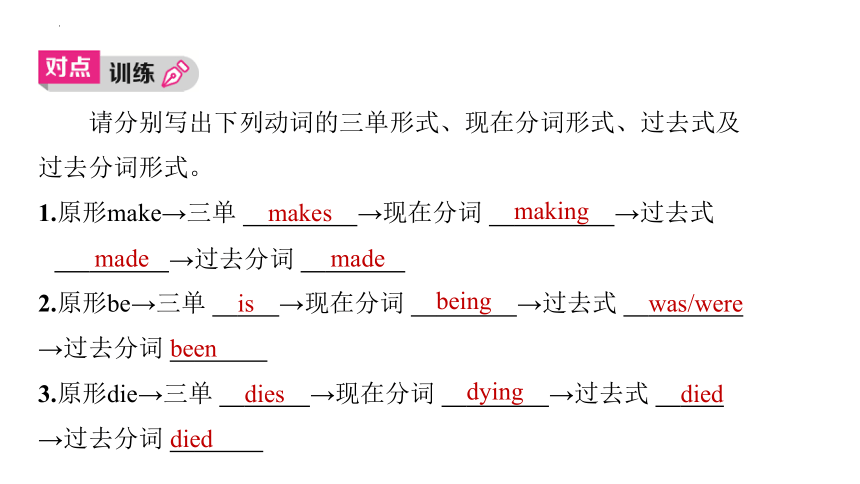
文档简介
(共66张PPT)
模块一 词类
第二节 动词(含动词短语)
分析广东近几年的中考真题可知,动词(短语)为每年的必考点,主要出现在完形填空和短文填空中。
动词的基本知识
一、动词的基本形式
形式 构成规则 示例
动词原形 动词的原始形式 choose;draw;show;spell
第三人称单数 1.一般情况直接在词尾加-s open→opens;drive→drives;read→reads
2.以字母s,x,ch,sh,o结尾的加-es dress→dresses;teach→teaches;do→does
3.以辅音字母+y 结尾的,先变y为i,再加-es fly→flies;try→tries;cry→cries;carry→carries
形式 构成规则 示例
现在分词 1.一般情况直接在词尾加-ing sleep→sleeping;speak→speaking;talk→talking
2.以不发音的字母e结尾的,先去e,再加-ing have→having;make→making;write→writing
3.以-ie结尾的,先把ie变为y,再加-ing 撒谎(lie→lying);捆住(tie→tying);死亡(die→dying)
形式 构成规则 示例
现在分词 4.以重读闭音节结尾且末尾只有一个辅音字母的,先双写辅音字母,再加-ing 砍(cut→cutting)了树,挖(dig→digging)了路,放下(put→putting)锄头去跑步(run→running),开始(begin→beginning)忘记(forget→forgetting)去购物(shop→shopping),停止(stop→stopping)游泳(swim→swimming),坐着(sit→sitting)跳绳(skip→skipping),赢(win→winning)得变化的套路
形式 构成规则 示例
过去式与 过去分词 1.一般情况直接加-ed open→opened;work→worked;depend→depended
2.以字母e结尾的,直接加-d close→closed;hope→hoped;live→lived
3.以辅音字母+y结尾的,先变y为i,再加-ed cry→cried;study→studied;hurry→hurried
形式 构成规则 示例
过去式与 过去分词 4.以重读闭音节结尾且末尾只有一个辅音字母的,先双写辅音字母,再加-ed plan→planned;stop→stopped;drop→dropped;shop→shopped
二、及物动词和不及物动词
实义动词是表示动作或状态的词,有实际含义,能独立作谓语。根据其后可否直接跟宾语,可以分为及物动词(vt.)和不及物动词(vi.)。
类别 用法 示例
及物动词 本身意义不完整,需要接宾语才能表达完整含义。有被动形式 He reached Shenzhen yesterday.他昨天到达深圳。(主语+谓语+宾语)
类别 用法 示例
及物动词 本身意义不完整,需要接宾语才能表达完整含义。有被动形式 He always makes me happy.他总是让我高兴。(主语+谓语+宾语+宾补)
Our teacher tells us a story every morning.我们老师每天早上给我们讲一个故事。{主语+谓语+间接宾语(人)+直接宾语(物)}
类别 用法 示例
不及物动词 本身意义完整,无需接宾语。无被动形式 When will she arrive? 她什么时候到?
若不及物动词需要接宾语,其后需加适当的介词 Everybody listened to the teacher with great interest.每个人都带着极大的兴趣听老师讲。
请分别写出下列动词的三单形式、现在分词形式、过去式及过去分词形式。
1.原形make→三单 makes →现在分词 making →过去式
made →过去分词 made
2.原形be→三单 is →现在分词 being →过去式 was/were →过去分词 been
3.原形die→三单 dies →现在分词 dying →过去式 died →过去分词 died
makes
making
made
made
is
being
was/were
been
dies
dying
died
died
4.原形pass→三单 passes →现在分词 passing →过去式
passed →过去分词 passed
5.原形stop→三单 stops →现在分词 stopping →过去式
stopped →过去分词 stopped
6.原形carry→三单 carries →现在分词 carrying →过去式 carried →过去分词 carried
7.原形buy→三单 buys →现在分词 buying →过去式
bought →过去分词 bought
8.原形put→三单 puts →现在分词 putting →过去式 put →过去分词 put
passes
passing
passed
passed
stops
stopping
stopped
stopped
carries
carrying
carried
carried
buys
buying
bought
bought
puts
putting
put
put
系动词和助动词
一、系动词
系动词本身有词义,但不能独立作谓语,后面必须接表语,构成系表结构,说明主语的性质、状态、身份或特征。其分类及用法如下:
类别 系动词 示例
1.表示状态的系动词 be动词(am,is,are,was,were) We are so glad to meet our classmates.我们很高兴见到我们的同学。
2.感官系动词 五感官:look(看起来),sound(听起来),taste(尝起来),smell(闻起来),feel(摸起来,感觉) The fish tastes very delicious.鱼肉尝起来很美味。
类别 系动词 示例
3.表示“似乎”的系动词 appear,seem Everyone seems happy except us.除了我们,每个人似乎都很高兴。
4.表示状态变化的系动词 五变:be/become(变成),get(变温),go(变质),grow(渐渐变得),turn(变色) After leaving school,he became a singer.离开学校后,他成为了一名歌手。
类别 系动词 示例
5.表示持续性的系动词,意为“保持” keep,remain,stay The noise kept him awake.噪音吵得他睡不着。
二、助动词
助动词本身无意义或意义不完整,不能独立作谓语。它需与别的动词连用,帮助构成各种时态、语态、否定句和疑问句等。常用的助动词有be,have/has/had,do/does/did,will和shall等。如:
He is drawing in the room.他在房间里画画。
They have planted 3,000 trees since 2019.从2019年开始他们已经种了3 000棵树。
9.Mom is cooking chicken soup,and it smells (smell) so good.
10.—Henry,did you drive back to your hometown during the Spring Festival?
—No.I was advised to take the train because the traffic is often the busiest at that time.
smells
was
11.—What a great success the film has made!
—That’s true.So far it has attracted many people to go to the cinema.
has
情态动词
情态动词 用法 示例
can/could意为“能,会” 表示能力 I can play the guitar.我会弹吉他。
can/could/may/might意为“可以”。might比may语气更委婉。其一般疑问句的肯定回答用can,否定回答用can’t/mustn’t 表示请求、许可 —May/Might I take photos here? 我可以在这里拍照吗?
—Yes,you can.是的,你可以。
—No,you mustn’t/can’t.不,禁止/不可以拍照。
情态动词 用法 示例
can’t意为“不能” 表示不允许 I’m afraid we can’t come.恐怕我们来不了。
mustn’t意为“禁止” You mustn’t say things like that.你千万别说那样的话。
情态动词 用法 示例
must意为“必须;一定”。其引导的一般疑问句,肯定回答用must,否定回答用needn’t/don’t have to 表示“必须” —Must I finish my work now? 我必须现在完成工作吗?
—Yes,you must.是的,你必须现在完成。
—No,you needn’t/don’t have to.不,你没必要现在完成。
情态动词 用法 示例
should意为“应该”,表示要求和命令,也可以表示劝告或建议,强调责任和义务 表示责任、义务 You should go to see the doctor.你应该去看医生。
情态动词 用法 示例
must意为“一定”,语气最强烈 表示推测 It must be Jack's school ID card, because his name and photo are on it.它一定是杰克的学生证,因为他的名字和照片在上面。
may意为“也许”,语气一般 He may like coffee. I see him drink a cup at times.他也许喜欢咖啡。我看到他有时会喝上一杯。
情态动词 用法 示例
might意为“或许”,语气更弱 表示推测 The man might be a doctor in this hospital,but I’m not sure.这个人或许是这家医院的一名医生,但是我不确定。
can’t意为“不可能” 表示推测 Miss Li can’t be in the classroom.I just saw her in the supermarket.李老师不可能在教室里。我刚在超市看到她。
情态动词 用法 示例
may not意为“可能不”,语气不确定 表示推测 It may not be my pen.它可能不是我的钢笔。
按照推测的可能性从大到小为:must>may>might/could>may not>can’t 拓展:(1)be able to表示能力,意为“能,会”,与can意思相同。但是be able to有人称、数的变化,可以用在各种时态中。如:
She is able to write a report.她能书写报告。
(2)have to表示客观需要,意为“不得不;必须”,有人称、时态和数的变化,后跟动词原形。如:
He had to stay at home because of the heavy rain.由于大雨他不得不待在家里。
(3)would表示意愿,常用于“Would you like …?”结构中。如:
Would you like something to eat? 你想吃点什么吗?
(4)will表示请求、征求意见,用于第二人称的疑问句中。如:
Will you meet me at the airport? 你到机场接我好吗?
(5)need意为“需要”,作情态动词时,常用于疑问句和否定句中。其引导的一般疑问句,肯定回答用must,否定回答用needn’t。如:
—Need I stay in hospital? 我需要住院吗?
—Yes,you must.是的,你必须住院。(说明病得严重)
—No,you needn’t.不,你没必要住院。(小问题不需要住院)
12.Dirty air and water are harmful.They can (can/should/can’t/shouldn’t) kill plants,and even people.
13.(2023湖北孝感改编)—How beautiful the paper cutting is! Who made it?
—It must (must/might/can/could) be Linda.She’s the only one that can make it in our class.
can
must
14.To keep children safe,we should (may/can/should/might) put the things like knives and medicine away in our house.
15.—Mum, may (would/need/may/should) I visit the Modern Art Museum next Monday?
—I’m afraid you can’t.All the museums in this city are closed on Monday.
should
may
16.My car is broken. Could (Must/Need/Should/Could) you please give me a lift?
17.You mustn’t (may/mustn’t/can/needn’t) fish here.Look at the sign “No fishing”!
18.—I wonder if this glass is Tom’s.
—It can’t (may not/mustn’t/can’t/shouldn’t) be his.His was broken just now.
Could
mustn’t
can’t
动词短语
一、常见的动词短语分类
分类 示例
动词+介词 agree with赞成;depend on依赖,依靠;laugh at嘲笑;point at指向
动词+副词 give up放弃;get up起床;look out当心;stay up熬夜;set off出发
动词+名词 make faces做鬼脸;have fun玩得开心;play sports做运动
分类 示例
动词+名词+介词 make friends with … 和……交朋友;take pride in … 为……感到骄傲;take care of照顾
动词+副词+介词 catch up with赶上;stay away from远离;get along with进展;相处
动词+介词+名词 go to school去上学;go to bed去睡觉
Tip: 对于“动词+副词”型短语,其宾语若是名词,放在二者之间或副词之后均可;其宾语若是人称代词,一定要放在二者之间,且用宾格。
同一动词型 come come across(偶然)遇见;come back 回来,返回;come from 来自;come up with想出;提出
get get away 离开; get back 返回;恢复;get on 上车;get off 下车;get up起床
give give away 捐赠;give back 归还;give out 分发;give in 屈服;give up放弃
二、常见动词短语
同一动词型 go go away 走开;离去;go by 走过,经过;(时间)流逝;go on doing/with sth.继续做某事;go through 经历;遭受
look look at 看;look after照料;照顾;look for 寻找;look up 查阅;向上看;look through浏览;look around 环顾;look forward to 盼望;期待
put put away 放好;put on 穿上;上演;增加(体重);put off推迟;put up举起;张贴;建造
同一动词型 Take take away 拿走;take off 脱下;(飞机)起飞;take place 发生;take out 取出
turn turn on 打开;turn off关闭;turn down调低(音量或热度);拒绝;turn up调高(音量或热度);出现
同一介词/副词型 about care about关心;在意;hear about 听说;think about考虑
for ask for 请求;恳求;care for 照顾;照料;pay for 付费;付出代价;prepare for 为……做准备;wait for等待
up grow up 成长;make up 编造;化妆;pick up捡起;(开车)接;取;set up 建立;wake up 醒来
with deal with处理;start/begin with以……开始;fill … with … 用……装满……
19.If you want to know more about space,please look through the book A Brief History of Time.
20.(2023广州完成句子51题改编)Have you ever heard (hear) about a maths project done by some students in Guangzhou?
look
heard
21.—Hurry up! Our plane will take off soon.
—Don’t worry.We still have enough time.
22.If you turn down his invitation,he will be unhappy.
take off
turn down
turn down take off
动词(含动词短语)词义辨析
分析广东近五年的中考真题可知,动词、动词短语词义辨析为每年的必考点,主要出现在完形填空和短文填空中。广东中考常考的动词、动词短语归纳详见右侧二维码。
分析广东近五年的中考完形填空可知,动词(短语)考查了18次(2023年4次:45.draw,46.changed,48.waiting for,49.holding;2022年4次:42.take away,44.help,46.work,47.share;2021年4次:41.looking for,47.protect,48.encouraging,49.see;2020年2次: 42.asked for,49.refused;2019年4次: 46.agree,48.went away,50.asked for,55.realize)。完形填空主要考查实义动词(短语)的词义辨析。针对该考点,考生需要根据句式结构和上下文语境或固定搭配,有时可联系常识或常理,并结合选项的词义辨析来确定答案。
一、动词(含动词短语)在完形填空中的运用
1.上下文判断法
(2023广东)She decided to 45 a picture of the tree each day….Dora drew her last picture of thetree
( )45.A.buy B.take C.draw D.borrow
解析:根据下文中的“Dora drew her last picture of the tree”可知,这里表示“她决定每天画一幅树的画”。故选C。
2.固定搭配
(2021广东)This job is to 47 the earth from germs(细菌) on things brought back from other planets.
( )47.A.move B.protect C.pull D.collect
解析:move移动;protect保护;pull拉;collect收集。由句意可知,这份工作应该是“保护”地球免受从其他行星带回来的物体上的细菌的危害。protect … from …意为“保护……免受……”,是固定搭配。故选B。
3.生活常识或常理
(2023广东)Day by day,the weather got cooler. The leaves slowly 46 their colour and tiny apples appeared among them.
( )46.A.shared B.found C.passed D.changed
解析:根据“the weather got cooler”和“tiny apples appeared among them”并联系常识可知,天变冷了,叶子会慢慢变颜色,树开始结果。故选D。
Along the way,everyone will have a lot of things to remember.One thing happened long time ago,but it has 23 in my mind.
It happened when I was in Grade Four.My biology teacher,Mr.White, 24 to the classroom five minutes before the class began.He looked excited and said to us,“Boys and girls,today I have a special but interesting task for you to 25 .Do you want to know what it is? Are you interested?” Everyone 26 great interest.We couldn’t wait to know what we would do next.
Later,Mr.White 27 us to go into the biology laboratory.“During the following days,one of your tasks is going to 28 what will happen to these caterpillars(毛毛虫) and what you have learned from the project.You should 29 the caterpillars carefully every day,” Mr.Write said and wrote some instructions on the blackboard.
( C )23.A.brought B.attended C.remained D.collected
( B )24.A.left B.came C.arrived D.took
( A )25.A.complete B.connect C.answer D.solve
( D )26.A.appeared B.formed C.shared D.showed
( B )27.A.lent B.led C.made D.sent
( A )28.A.find out B.work out C.put out D.take out
( D )29.A.feel B.taste C.listen D.watch
C
B
A
D
B
A
D
二、动词(含动词短语)在短文填空中的运用
分析广东近五年的中考短文填空可知,动词考查了10次:2023(68.cleaned,69.be),2022(72.become,73.drink),2021(68.call,69.worked,71.written),2020(68.wear,72.set),2019(77.take)。针对该考点,考生需要根据句式结构和上下文语境或固定搭配判断所填的词是动词,并结合时态、动词前是否有动词不定式符号to或情态动词等确定所填动词的正确形式。
1.上下文判断法
it either be because what else by invent clean popular habit hundred
(2023广东)According to some research,before toothbrushes appeared,the ancient Chinese people 68.
Their teeth with some tree branches(树枝)
解析:根据空前的“before toothbrushes appeared”和空后的“their teeth with some small tree branches(树枝)”,并结合备选词可知,这里指“清洁牙齿”;根据空前的“before toothbrushes appeared”及“the ancient Chinese people”可知,此处描述的动作发生在过去,应用一般过去时,动词需用过去式。故填cleaned。
2.固定搭配
(2021广东)In 1988,Lao Pan first come to China and 69. as a teacher at a university.
解析:由空后的“as a teacher”可推测出,老潘应该是在一所大学里“当”老师。work as+职业,表示“担任……”。and连接两个并列谓语,其时态和人称保持一致,came为过去式,所以空处也应用work的过去式worked。故填worked。
One day,Peter went fishing in the river.A few minutes later,a woman with her husband 30. passed by and she told Peter they wanted to go to a shop to buy something they need,leaving their baby in the boat.
About 10 minutes later,Peter saw smoke 31. coming out of the boat.“It’s on fire!” he cried.
passed
coming
Peter ran into the boat with a wet handkerchief covering his mouth and nose.He couldn’t 32. see very well because of the smoke.Finally,he ran out of the boat with a baby in his arms.At this time,the couple came back and they 33. put out the fire.They thanked Peter for saving their baby.
see
put
一、固定搭配的误用。
1.—Do you remember when we first met?
—Let me see (see/think)… Five years ago.
2.Helen is so old that she can dress (wear/dress) herself.
3.You can play basketball if your parents allow (allow/agree) you to do so.
see
dress
allow
二、情态动词的误用。
4.—Must I return this book this afternoon?
—No,you needn’t . You can keep it for another two days.
5.It is raining heavily now,but it may (may/must) become sunny later.
6.You mustn’t speak loudly in the library.
needn’t
may
mustn’t
一、短文填空之基础训练(有两词多余)
can may have finish share must encourage protect take value deal give
1.Our teacher encourages us to read more books every day to enrich our knowledge.
2.Alice often shares the fun of doing DIY with us.She is so creative!
3.To protect our eyesight,we’d better relax for a while after reading for a long time.
encourages
shares
protect
4.We should value the friendship that we have developed in the past three years.
5.Betty is slow in doing anything,so it’s impossible for her to finish the work on time.
6.—Whose blue T-shirt is this,Michael?
—It can’t be mine.Mine is white.
value
finish
can’t
7.—What will the weather be like tomorrow?
—It may/might be rainy,cloudy or sunny.I am not sure.
8.Mary’s parents used to be very busy,so she had (have) to look after herself most of the time.
9.Our government is looking for some ways,including the three-child policy(政策) to deal with the problem of aging population(人口老龄化).
10.Every student is supposed to take up a sporting activity for a healthy life.
may/might
had
deal
take
二、根据句意填写适当的单词(盲填)
11.You added sugar in my tea? It tastes terrible!
12.Jim,you’d better not spend too much time on your mobile phone.
13.Don’t compare your child with others because every child is a treasure.
14.—I will go swimming this afternoon,Daming.
—If you go,so will I.
tastes
spend
compare
will
15.The computer broke down yesterday,but someone has fixed it.
broke
一、完形填空
Adam Lee is a very popular man in Ottawa.He is not famous in sports or the arts.But people in the streets know about him, 1 the poor.
For those people,he is “Gloves Lee”.How did he get that 2 ?He looks like any other businessman,wearing a suit and carrying a briefcase(公文包).But he’s 3 .His briefcase always has some gloves.
In winter,Mr.Lee walks in the streets, 4 at people.He stops when he sees someone with no gloves.He gives them a pair and then he moves on,looking for more people with cold 5 .
On winter days,Mr.Lee gives away gloves.During the rest of the year,he 6 gloves from shops.People who have 7 him send him gloves,so he has many at home.
Lee began doing this 21 years ago.Now,many poor people in the city know him and 8 his behavior.But people who don’t know him are sometimes surprised by him.They don’t 9 that he just wants to make them warm.A pair of gloves may be a small thing,but it can 10 a big difference in winter.
( C )1.A.widely B.exactly C.especially D.totally
( D )2.A.chance B.project C.courage D.name
( A )3.A.different B.humorous C.mean D.helpful
( B )4.A.looking forward B.looking around
C.looking up D.looking down upon
( D )5.A.feet B.ears C.faces D.hands
( B )6.A.produces B.buys C.receives D.sells
( A )7.A.heard of B.taken care of C.thought of D.talked of
( B )8.A.excuse B.understand C.regret D.dislike
( C )9.A.allow B.expect C.realize D.imagine
( B )10.A.take B.make C.show D.turn
C
D
A
B
D
B
A
B
C
B
二、短文填空
I they can ask listen look fall follow understand behind other some
Last year,I did not like my English class.Every class was like a bad dream.The teacher spoke so quickly that I could hardly 1. follow her most of the time.I was afraid to 2. ask questions because of my poor pronunciation.I just hid 3. behind my textbook and never said anything.
follow
ask
behind
Then one day I watched an English movie named Toy Story.I 4.
fell in love with this exciting and funny movie! So I began to watch 5. other English movies,too.Although I could not understand everything the characters said,their body language and the expressions on their faces helped 6. me to get the meaning.I also realized I could get the meaning by 7. listening for just the key words.Besides,I learned some useful sentences like “It’s a piece of cake” or “It serves you right”.I didn’t 8. understand these sentences at first.But because I wanted to understand the story,I 9. looked them up in a dictionary.
Now I really enjoy my English class.I want to learn new words and more grammar so that I 10. can have a much clearer understanding of English movies.
fell
other
me
listening
understand
looked
can
模块一 词类
第二节 动词(含动词短语)
分析广东近几年的中考真题可知,动词(短语)为每年的必考点,主要出现在完形填空和短文填空中。
动词的基本知识
一、动词的基本形式
形式 构成规则 示例
动词原形 动词的原始形式 choose;draw;show;spell
第三人称单数 1.一般情况直接在词尾加-s open→opens;drive→drives;read→reads
2.以字母s,x,ch,sh,o结尾的加-es dress→dresses;teach→teaches;do→does
3.以辅音字母+y 结尾的,先变y为i,再加-es fly→flies;try→tries;cry→cries;carry→carries
形式 构成规则 示例
现在分词 1.一般情况直接在词尾加-ing sleep→sleeping;speak→speaking;talk→talking
2.以不发音的字母e结尾的,先去e,再加-ing have→having;make→making;write→writing
3.以-ie结尾的,先把ie变为y,再加-ing 撒谎(lie→lying);捆住(tie→tying);死亡(die→dying)
形式 构成规则 示例
现在分词 4.以重读闭音节结尾且末尾只有一个辅音字母的,先双写辅音字母,再加-ing 砍(cut→cutting)了树,挖(dig→digging)了路,放下(put→putting)锄头去跑步(run→running),开始(begin→beginning)忘记(forget→forgetting)去购物(shop→shopping),停止(stop→stopping)游泳(swim→swimming),坐着(sit→sitting)跳绳(skip→skipping),赢(win→winning)得变化的套路
形式 构成规则 示例
过去式与 过去分词 1.一般情况直接加-ed open→opened;work→worked;depend→depended
2.以字母e结尾的,直接加-d close→closed;hope→hoped;live→lived
3.以辅音字母+y结尾的,先变y为i,再加-ed cry→cried;study→studied;hurry→hurried
形式 构成规则 示例
过去式与 过去分词 4.以重读闭音节结尾且末尾只有一个辅音字母的,先双写辅音字母,再加-ed plan→planned;stop→stopped;drop→dropped;shop→shopped
二、及物动词和不及物动词
实义动词是表示动作或状态的词,有实际含义,能独立作谓语。根据其后可否直接跟宾语,可以分为及物动词(vt.)和不及物动词(vi.)。
类别 用法 示例
及物动词 本身意义不完整,需要接宾语才能表达完整含义。有被动形式 He reached Shenzhen yesterday.他昨天到达深圳。(主语+谓语+宾语)
类别 用法 示例
及物动词 本身意义不完整,需要接宾语才能表达完整含义。有被动形式 He always makes me happy.他总是让我高兴。(主语+谓语+宾语+宾补)
Our teacher tells us a story every morning.我们老师每天早上给我们讲一个故事。{主语+谓语+间接宾语(人)+直接宾语(物)}
类别 用法 示例
不及物动词 本身意义完整,无需接宾语。无被动形式 When will she arrive? 她什么时候到?
若不及物动词需要接宾语,其后需加适当的介词 Everybody listened to the teacher with great interest.每个人都带着极大的兴趣听老师讲。
请分别写出下列动词的三单形式、现在分词形式、过去式及过去分词形式。
1.原形make→三单 makes →现在分词 making →过去式
made →过去分词 made
2.原形be→三单 is →现在分词 being →过去式 was/were →过去分词 been
3.原形die→三单 dies →现在分词 dying →过去式 died →过去分词 died
makes
making
made
made
is
being
was/were
been
dies
dying
died
died
4.原形pass→三单 passes →现在分词 passing →过去式
passed →过去分词 passed
5.原形stop→三单 stops →现在分词 stopping →过去式
stopped →过去分词 stopped
6.原形carry→三单 carries →现在分词 carrying →过去式 carried →过去分词 carried
7.原形buy→三单 buys →现在分词 buying →过去式
bought →过去分词 bought
8.原形put→三单 puts →现在分词 putting →过去式 put →过去分词 put
passes
passing
passed
passed
stops
stopping
stopped
stopped
carries
carrying
carried
carried
buys
buying
bought
bought
puts
putting
put
put
系动词和助动词
一、系动词
系动词本身有词义,但不能独立作谓语,后面必须接表语,构成系表结构,说明主语的性质、状态、身份或特征。其分类及用法如下:
类别 系动词 示例
1.表示状态的系动词 be动词(am,is,are,was,were) We are so glad to meet our classmates.我们很高兴见到我们的同学。
2.感官系动词 五感官:look(看起来),sound(听起来),taste(尝起来),smell(闻起来),feel(摸起来,感觉) The fish tastes very delicious.鱼肉尝起来很美味。
类别 系动词 示例
3.表示“似乎”的系动词 appear,seem Everyone seems happy except us.除了我们,每个人似乎都很高兴。
4.表示状态变化的系动词 五变:be/become(变成),get(变温),go(变质),grow(渐渐变得),turn(变色) After leaving school,he became a singer.离开学校后,他成为了一名歌手。
类别 系动词 示例
5.表示持续性的系动词,意为“保持” keep,remain,stay The noise kept him awake.噪音吵得他睡不着。
二、助动词
助动词本身无意义或意义不完整,不能独立作谓语。它需与别的动词连用,帮助构成各种时态、语态、否定句和疑问句等。常用的助动词有be,have/has/had,do/does/did,will和shall等。如:
He is drawing in the room.他在房间里画画。
They have planted 3,000 trees since 2019.从2019年开始他们已经种了3 000棵树。
9.Mom is cooking chicken soup,and it smells (smell) so good.
10.—Henry,did you drive back to your hometown during the Spring Festival?
—No.I was advised to take the train because the traffic is often the busiest at that time.
smells
was
11.—What a great success the film has made!
—That’s true.So far it has attracted many people to go to the cinema.
has
情态动词
情态动词 用法 示例
can/could意为“能,会” 表示能力 I can play the guitar.我会弹吉他。
can/could/may/might意为“可以”。might比may语气更委婉。其一般疑问句的肯定回答用can,否定回答用can’t/mustn’t 表示请求、许可 —May/Might I take photos here? 我可以在这里拍照吗?
—Yes,you can.是的,你可以。
—No,you mustn’t/can’t.不,禁止/不可以拍照。
情态动词 用法 示例
can’t意为“不能” 表示不允许 I’m afraid we can’t come.恐怕我们来不了。
mustn’t意为“禁止” You mustn’t say things like that.你千万别说那样的话。
情态动词 用法 示例
must意为“必须;一定”。其引导的一般疑问句,肯定回答用must,否定回答用needn’t/don’t have to 表示“必须” —Must I finish my work now? 我必须现在完成工作吗?
—Yes,you must.是的,你必须现在完成。
—No,you needn’t/don’t have to.不,你没必要现在完成。
情态动词 用法 示例
should意为“应该”,表示要求和命令,也可以表示劝告或建议,强调责任和义务 表示责任、义务 You should go to see the doctor.你应该去看医生。
情态动词 用法 示例
must意为“一定”,语气最强烈 表示推测 It must be Jack's school ID card, because his name and photo are on it.它一定是杰克的学生证,因为他的名字和照片在上面。
may意为“也许”,语气一般 He may like coffee. I see him drink a cup at times.他也许喜欢咖啡。我看到他有时会喝上一杯。
情态动词 用法 示例
might意为“或许”,语气更弱 表示推测 The man might be a doctor in this hospital,but I’m not sure.这个人或许是这家医院的一名医生,但是我不确定。
can’t意为“不可能” 表示推测 Miss Li can’t be in the classroom.I just saw her in the supermarket.李老师不可能在教室里。我刚在超市看到她。
情态动词 用法 示例
may not意为“可能不”,语气不确定 表示推测 It may not be my pen.它可能不是我的钢笔。
按照推测的可能性从大到小为:must>may>might/could>may not>can’t 拓展:(1)be able to表示能力,意为“能,会”,与can意思相同。但是be able to有人称、数的变化,可以用在各种时态中。如:
She is able to write a report.她能书写报告。
(2)have to表示客观需要,意为“不得不;必须”,有人称、时态和数的变化,后跟动词原形。如:
He had to stay at home because of the heavy rain.由于大雨他不得不待在家里。
(3)would表示意愿,常用于“Would you like …?”结构中。如:
Would you like something to eat? 你想吃点什么吗?
(4)will表示请求、征求意见,用于第二人称的疑问句中。如:
Will you meet me at the airport? 你到机场接我好吗?
(5)need意为“需要”,作情态动词时,常用于疑问句和否定句中。其引导的一般疑问句,肯定回答用must,否定回答用needn’t。如:
—Need I stay in hospital? 我需要住院吗?
—Yes,you must.是的,你必须住院。(说明病得严重)
—No,you needn’t.不,你没必要住院。(小问题不需要住院)
12.Dirty air and water are harmful.They can (can/should/can’t/shouldn’t) kill plants,and even people.
13.(2023湖北孝感改编)—How beautiful the paper cutting is! Who made it?
—It must (must/might/can/could) be Linda.She’s the only one that can make it in our class.
can
must
14.To keep children safe,we should (may/can/should/might) put the things like knives and medicine away in our house.
15.—Mum, may (would/need/may/should) I visit the Modern Art Museum next Monday?
—I’m afraid you can’t.All the museums in this city are closed on Monday.
should
may
16.My car is broken. Could (Must/Need/Should/Could) you please give me a lift?
17.You mustn’t (may/mustn’t/can/needn’t) fish here.Look at the sign “No fishing”!
18.—I wonder if this glass is Tom’s.
—It can’t (may not/mustn’t/can’t/shouldn’t) be his.His was broken just now.
Could
mustn’t
can’t
动词短语
一、常见的动词短语分类
分类 示例
动词+介词 agree with赞成;depend on依赖,依靠;laugh at嘲笑;point at指向
动词+副词 give up放弃;get up起床;look out当心;stay up熬夜;set off出发
动词+名词 make faces做鬼脸;have fun玩得开心;play sports做运动
分类 示例
动词+名词+介词 make friends with … 和……交朋友;take pride in … 为……感到骄傲;take care of照顾
动词+副词+介词 catch up with赶上;stay away from远离;get along with进展;相处
动词+介词+名词 go to school去上学;go to bed去睡觉
Tip: 对于“动词+副词”型短语,其宾语若是名词,放在二者之间或副词之后均可;其宾语若是人称代词,一定要放在二者之间,且用宾格。
同一动词型 come come across(偶然)遇见;come back 回来,返回;come from 来自;come up with想出;提出
get get away 离开; get back 返回;恢复;get on 上车;get off 下车;get up起床
give give away 捐赠;give back 归还;give out 分发;give in 屈服;give up放弃
二、常见动词短语
同一动词型 go go away 走开;离去;go by 走过,经过;(时间)流逝;go on doing/with sth.继续做某事;go through 经历;遭受
look look at 看;look after照料;照顾;look for 寻找;look up 查阅;向上看;look through浏览;look around 环顾;look forward to 盼望;期待
put put away 放好;put on 穿上;上演;增加(体重);put off推迟;put up举起;张贴;建造
同一动词型 Take take away 拿走;take off 脱下;(飞机)起飞;take place 发生;take out 取出
turn turn on 打开;turn off关闭;turn down调低(音量或热度);拒绝;turn up调高(音量或热度);出现
同一介词/副词型 about care about关心;在意;hear about 听说;think about考虑
for ask for 请求;恳求;care for 照顾;照料;pay for 付费;付出代价;prepare for 为……做准备;wait for等待
up grow up 成长;make up 编造;化妆;pick up捡起;(开车)接;取;set up 建立;wake up 醒来
with deal with处理;start/begin with以……开始;fill … with … 用……装满……
19.If you want to know more about space,please look through the book A Brief History of Time.
20.(2023广州完成句子51题改编)Have you ever heard (hear) about a maths project done by some students in Guangzhou?
look
heard
21.—Hurry up! Our plane will take off soon.
—Don’t worry.We still have enough time.
22.If you turn down his invitation,he will be unhappy.
take off
turn down
turn down take off
动词(含动词短语)词义辨析
分析广东近五年的中考真题可知,动词、动词短语词义辨析为每年的必考点,主要出现在完形填空和短文填空中。广东中考常考的动词、动词短语归纳详见右侧二维码。
分析广东近五年的中考完形填空可知,动词(短语)考查了18次(2023年4次:45.draw,46.changed,48.waiting for,49.holding;2022年4次:42.take away,44.help,46.work,47.share;2021年4次:41.looking for,47.protect,48.encouraging,49.see;2020年2次: 42.asked for,49.refused;2019年4次: 46.agree,48.went away,50.asked for,55.realize)。完形填空主要考查实义动词(短语)的词义辨析。针对该考点,考生需要根据句式结构和上下文语境或固定搭配,有时可联系常识或常理,并结合选项的词义辨析来确定答案。
一、动词(含动词短语)在完形填空中的运用
1.上下文判断法
(2023广东)She decided to 45 a picture of the tree each day….Dora drew her last picture of thetree
( )45.A.buy B.take C.draw D.borrow
解析:根据下文中的“Dora drew her last picture of the tree”可知,这里表示“她决定每天画一幅树的画”。故选C。
2.固定搭配
(2021广东)This job is to 47 the earth from germs(细菌) on things brought back from other planets.
( )47.A.move B.protect C.pull D.collect
解析:move移动;protect保护;pull拉;collect收集。由句意可知,这份工作应该是“保护”地球免受从其他行星带回来的物体上的细菌的危害。protect … from …意为“保护……免受……”,是固定搭配。故选B。
3.生活常识或常理
(2023广东)Day by day,the weather got cooler. The leaves slowly 46 their colour and tiny apples appeared among them.
( )46.A.shared B.found C.passed D.changed
解析:根据“the weather got cooler”和“tiny apples appeared among them”并联系常识可知,天变冷了,叶子会慢慢变颜色,树开始结果。故选D。
Along the way,everyone will have a lot of things to remember.One thing happened long time ago,but it has 23 in my mind.
It happened when I was in Grade Four.My biology teacher,Mr.White, 24 to the classroom five minutes before the class began.He looked excited and said to us,“Boys and girls,today I have a special but interesting task for you to 25 .Do you want to know what it is? Are you interested?” Everyone 26 great interest.We couldn’t wait to know what we would do next.
Later,Mr.White 27 us to go into the biology laboratory.“During the following days,one of your tasks is going to 28 what will happen to these caterpillars(毛毛虫) and what you have learned from the project.You should 29 the caterpillars carefully every day,” Mr.Write said and wrote some instructions on the blackboard.
( C )23.A.brought B.attended C.remained D.collected
( B )24.A.left B.came C.arrived D.took
( A )25.A.complete B.connect C.answer D.solve
( D )26.A.appeared B.formed C.shared D.showed
( B )27.A.lent B.led C.made D.sent
( A )28.A.find out B.work out C.put out D.take out
( D )29.A.feel B.taste C.listen D.watch
C
B
A
D
B
A
D
二、动词(含动词短语)在短文填空中的运用
分析广东近五年的中考短文填空可知,动词考查了10次:2023(68.cleaned,69.be),2022(72.become,73.drink),2021(68.call,69.worked,71.written),2020(68.wear,72.set),2019(77.take)。针对该考点,考生需要根据句式结构和上下文语境或固定搭配判断所填的词是动词,并结合时态、动词前是否有动词不定式符号to或情态动词等确定所填动词的正确形式。
1.上下文判断法
it either be because what else by invent clean popular habit hundred
(2023广东)According to some research,before toothbrushes appeared,the ancient Chinese people 68.
Their teeth with some tree branches(树枝)
解析:根据空前的“before toothbrushes appeared”和空后的“their teeth with some small tree branches(树枝)”,并结合备选词可知,这里指“清洁牙齿”;根据空前的“before toothbrushes appeared”及“the ancient Chinese people”可知,此处描述的动作发生在过去,应用一般过去时,动词需用过去式。故填cleaned。
2.固定搭配
(2021广东)In 1988,Lao Pan first come to China and 69. as a teacher at a university.
解析:由空后的“as a teacher”可推测出,老潘应该是在一所大学里“当”老师。work as+职业,表示“担任……”。and连接两个并列谓语,其时态和人称保持一致,came为过去式,所以空处也应用work的过去式worked。故填worked。
One day,Peter went fishing in the river.A few minutes later,a woman with her husband 30. passed by and she told Peter they wanted to go to a shop to buy something they need,leaving their baby in the boat.
About 10 minutes later,Peter saw smoke 31. coming out of the boat.“It’s on fire!” he cried.
passed
coming
Peter ran into the boat with a wet handkerchief covering his mouth and nose.He couldn’t 32. see very well because of the smoke.Finally,he ran out of the boat with a baby in his arms.At this time,the couple came back and they 33. put out the fire.They thanked Peter for saving their baby.
see
put
一、固定搭配的误用。
1.—Do you remember when we first met?
—Let me see (see/think)… Five years ago.
2.Helen is so old that she can dress (wear/dress) herself.
3.You can play basketball if your parents allow (allow/agree) you to do so.
see
dress
allow
二、情态动词的误用。
4.—Must I return this book this afternoon?
—No,you needn’t . You can keep it for another two days.
5.It is raining heavily now,but it may (may/must) become sunny later.
6.You mustn’t speak loudly in the library.
needn’t
may
mustn’t
一、短文填空之基础训练(有两词多余)
can may have finish share must encourage protect take value deal give
1.Our teacher encourages us to read more books every day to enrich our knowledge.
2.Alice often shares the fun of doing DIY with us.She is so creative!
3.To protect our eyesight,we’d better relax for a while after reading for a long time.
encourages
shares
protect
4.We should value the friendship that we have developed in the past three years.
5.Betty is slow in doing anything,so it’s impossible for her to finish the work on time.
6.—Whose blue T-shirt is this,Michael?
—It can’t be mine.Mine is white.
value
finish
can’t
7.—What will the weather be like tomorrow?
—It may/might be rainy,cloudy or sunny.I am not sure.
8.Mary’s parents used to be very busy,so she had (have) to look after herself most of the time.
9.Our government is looking for some ways,including the three-child policy(政策) to deal with the problem of aging population(人口老龄化).
10.Every student is supposed to take up a sporting activity for a healthy life.
may/might
had
deal
take
二、根据句意填写适当的单词(盲填)
11.You added sugar in my tea? It tastes terrible!
12.Jim,you’d better not spend too much time on your mobile phone.
13.Don’t compare your child with others because every child is a treasure.
14.—I will go swimming this afternoon,Daming.
—If you go,so will I.
tastes
spend
compare
will
15.The computer broke down yesterday,but someone has fixed it.
broke
一、完形填空
Adam Lee is a very popular man in Ottawa.He is not famous in sports or the arts.But people in the streets know about him, 1 the poor.
For those people,he is “Gloves Lee”.How did he get that 2 ?He looks like any other businessman,wearing a suit and carrying a briefcase(公文包).But he’s 3 .His briefcase always has some gloves.
In winter,Mr.Lee walks in the streets, 4 at people.He stops when he sees someone with no gloves.He gives them a pair and then he moves on,looking for more people with cold 5 .
On winter days,Mr.Lee gives away gloves.During the rest of the year,he 6 gloves from shops.People who have 7 him send him gloves,so he has many at home.
Lee began doing this 21 years ago.Now,many poor people in the city know him and 8 his behavior.But people who don’t know him are sometimes surprised by him.They don’t 9 that he just wants to make them warm.A pair of gloves may be a small thing,but it can 10 a big difference in winter.
( C )1.A.widely B.exactly C.especially D.totally
( D )2.A.chance B.project C.courage D.name
( A )3.A.different B.humorous C.mean D.helpful
( B )4.A.looking forward B.looking around
C.looking up D.looking down upon
( D )5.A.feet B.ears C.faces D.hands
( B )6.A.produces B.buys C.receives D.sells
( A )7.A.heard of B.taken care of C.thought of D.talked of
( B )8.A.excuse B.understand C.regret D.dislike
( C )9.A.allow B.expect C.realize D.imagine
( B )10.A.take B.make C.show D.turn
C
D
A
B
D
B
A
B
C
B
二、短文填空
I they can ask listen look fall follow understand behind other some
Last year,I did not like my English class.Every class was like a bad dream.The teacher spoke so quickly that I could hardly 1. follow her most of the time.I was afraid to 2. ask questions because of my poor pronunciation.I just hid 3. behind my textbook and never said anything.
follow
ask
behind
Then one day I watched an English movie named Toy Story.I 4.
fell in love with this exciting and funny movie! So I began to watch 5. other English movies,too.Although I could not understand everything the characters said,their body language and the expressions on their faces helped 6. me to get the meaning.I also realized I could get the meaning by 7. listening for just the key words.Besides,I learned some useful sentences like “It’s a piece of cake” or “It serves you right”.I didn’t 8. understand these sentences at first.But because I wanted to understand the story,I 9. looked them up in a dictionary.
Now I really enjoy my English class.I want to learn new words and more grammar so that I 10. can have a much clearer understanding of English movies.
fell
other
me
listening
understand
looked
can
同课章节目录
- 词法
- 名词
- 动词和动词短语
- 动词语态
- 动词时态
- 助动词和情态动词
- 非谓语动词
- 冠词
- 代词
- 数词和量词
- 形容词副词及其比较等级
- 介词和介词短语
- 连词和感叹词
- 构词法
- 相似、相近词比较
- 句法
- 陈述句
- 一般疑问句和否定疑问句
- 特殊疑问句及选择疑问句
- 反意疑问句
- 存在句(There be句型)
- 宾语从句
- 定语从句
- 状语从句
- 主谓一致问题
- 简单句
- 并列句
- 复合句
- 主谓一致
- 主、表语从句
- 名词性从句
- 直接引语和间接引语
- 虚拟语气
- 感叹句
- 强调句
- 倒装句
- 祈使句
- 句子的成分
- 句子的分类
- 题型专区
- 单项选择部分
- 易错题
- 完形填空
- 阅读理解
- 词汇练习
- 听说训练
- 句型转换
- 补全对话
- 短文改错
- 翻译
- 书面表达
- 任务型阅读
- 语法填空
- 其他资料
